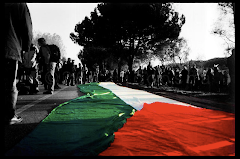I'm currently reading a book called Palestinian Walks, by Raja Shehadeh. The book outlines seven walks across the Palestinian hills that Raja made from the 1970s to 2007. Throughout the book he describes the beautiful flora and fauna of the country, while weaving in characters and experiences that took place within that time frame.
It is a very peaceful approach to portraying the Palestinian crisis, with no direct political or religious interference. The book gives you the feeling that the author is simply writing to conserve his memories of the land and to share its magnificence with those who were not able to experience it for themselves. A land that is no longer available to be experienced. Raja ignites in the reader a sense of true loss.
The excerpt I'm sharing here, although maybe not the most powerful or descriptive passage in the book, affected me a lot. The horrifying truth that the average Palestinian remaining in Palestine must face and overcome such treatment and hardships as a daily part of life is disturbing. What is more disturbing however is that this is happening in their homes, on their land, amongst their hills... nothing could be more heart-breaking.
Raja's frank and matter-of-fact portrayal of this - in the below passage - left me struggling with feelings of anger, despair, and gut-wrenching guilt.
Sabri and his family stood their ground. Their ordeal lasted for over twenty-four years. It was still continuing when I visited him in May 2006. Despite the incessant pressure he had managed to stay in his house at the top of the hill. But now the settlement surrounded the house from three sides. A wire fence was built around the house leaving him a passageway only a few metres wide. He was able to save only a fraction of his agricultural land; the rest was taken over by the settlement. The current issue that was absorbing his attention when I visited was that the Separation Wall Israel was building would cut him off from his village and the houses he had built for his children down the hill. He would end up on the side of the settlement, an unwelcome Gentile in the midst of housing planned only for Jews. He was now contesting the path of the wall at the Israeli High Court of Justice, adding another case to the numerous earlier challenges he took to that court expecting justice, only to be rebuffed time and time again. Sabri and I were standing outside in the sun looking at the settlement through the wire fence built around his house. He was telling me about this latest case when we saw an old man walking his Labrador on the other side of the fence. I tried hard to catch the man’s eye. I wanted some indication of how he felt confining his neighbour in this way, but the man would not raise his eyes from the ground. He went solemnly through his walk, keeping pace with his dog, never showing any recognition of Sabri or his guest.
The resilience of Sabri, whose name itself means patience, was legendary. But the long gruelling struggle against the settlers, the World Zionist Organization and the military government supporting them was taking its toll on him. Though he still had fire in his big black fearless eyes as he spoke with courage and confidence about his plight, his health was deteriorating. It was only on my last visit that I discovered that Sabri, who had ten children, was an only child. He had inherited from his father the large area of family land which he was determined to preserve and pass on to his children. I also realized that the courageous fighter was not concerned with nationalist issues. He believed in only two constants, God and the land. Not to fight in every way possible to hold on to his land was sacrilege.










No comments:
Post a Comment